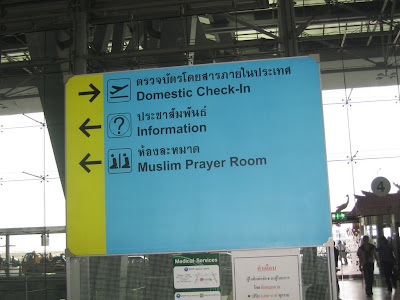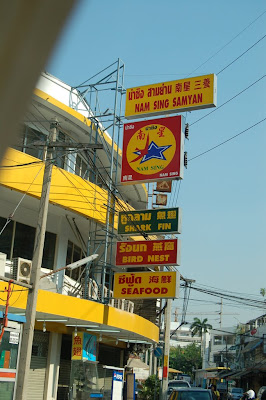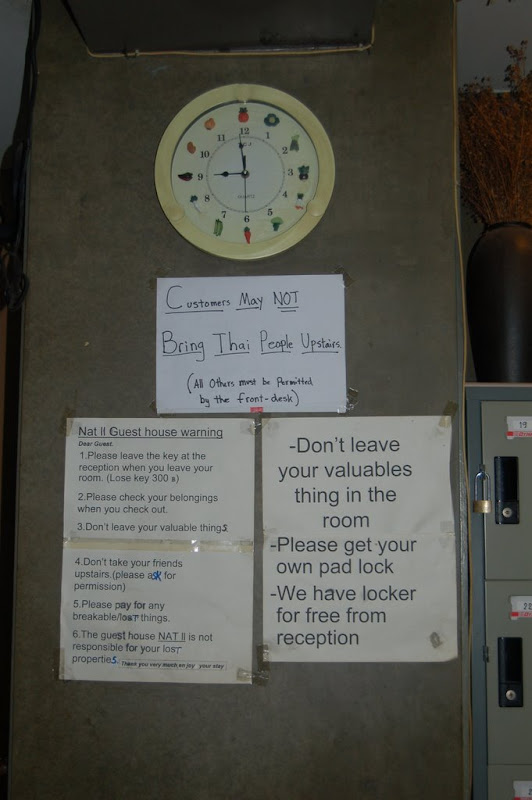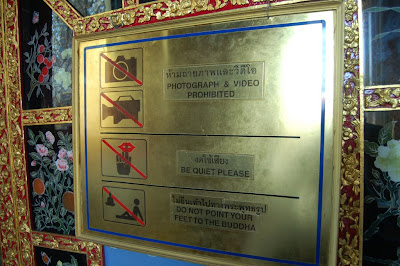I am in England now and am going through some reverse culture shock alongside my jet lag. I think that reserve culture shock involves things you are surprised by and notice suddenly in a familiar culture that before you wouldn't have looked twice at. Also it can be missing things from the experience you just had, such as friends or food or cultural aspects, and wanting to tell people about it but getting the impression that they don't really want to know beyond "How was India?" "Good.." "Cool." So far what I am characterizing as reverse culture shock has been more surprising and interesting more than shocking, and indeed much of it has been rather pleasant surprises rather than things that have made me feel out of place or disturbed.
Reverse culture shock/observations:
-EVERYONE says "to be fair" - all my British friends, and often, more so than me!!! (Lily and Shlayma always made fun of how often I said that)
-You can drink tap water! You can cook with tap water! You can wash a tomato and eat it even if there is still water residue on it!
-I spent 10 pounds on my first meal here, which is $20, which is 800 rupees.
-My friend described another girl as "stark raving bonkers." gotta love it.
-Electric tea kettles! Tea quickly! Tea English style!
-Getting used to not being afraid of any kind of physical contact with the opposite sex - hugs, brushing, just in general not having taboos about accidental contact.
-Mini skirts! So much skin showing! People making out in clubs! These things have actually been the most shocking for me.
-Left hand usage - getting used to using my left hand.
-Feet - I'm afraid of offending people with my feet, and am feeling offended by other people's feet.
-There's toilet paper everywhere! I don't have to bring it in my purse! Amazing.
-Lettuce! Sweet beautiful lettuce! Not just in salads - as sides with other dishes! Wow!!!!
-And in England - sunset around 10:30pm! Holy shit! In India it gets dark around 6-7!
-I had a conversation with an Indian about culture and Indian food and we made each other food and I felt a strong identity with him, like we really understood where we were both coming from.
Planet Bollywood
Wednesday, June 18, 2008
Saturday, June 7, 2008
Last day
Yesterday was my last day at my NGO. I wore my purple saree for the occasion with gold sparkly bangles that got sparkles all over everything I went near, much to the amusement of my coworkers.
We had a meeting with all the staff and bosses in which I spoke about my time as a volunteer and my supervisor talked about my work. They thanked me graciously for my time spent there and presented me with a Hyderabad freshwater pearl necklace with earrings and a hardcover coffee table book of my favorite book that they publish, Womanscape. The mini ceremony was followed by a wonderful catered lunch. I said goodbye to all my coworkers at the end of the day and promised not to forget them.
Today Shlayma, Lily and I are cleaning our flat and packing our bags. It's amazing how much stuff I acquired when I came here with only a backpackers backpack and a bookbag.
Tomorrow we take a 26 hour train to Delhi, where we will have our final AJWS retreat. Then I go to Britain for two weeks, then Serbia for a week. I will do my best to post during this month of travel.
We had a meeting with all the staff and bosses in which I spoke about my time as a volunteer and my supervisor talked about my work. They thanked me graciously for my time spent there and presented me with a Hyderabad freshwater pearl necklace with earrings and a hardcover coffee table book of my favorite book that they publish, Womanscape. The mini ceremony was followed by a wonderful catered lunch. I said goodbye to all my coworkers at the end of the day and promised not to forget them.
Today Shlayma, Lily and I are cleaning our flat and packing our bags. It's amazing how much stuff I acquired when I came here with only a backpackers backpack and a bookbag.
Tomorrow we take a 26 hour train to Delhi, where we will have our final AJWS retreat. Then I go to Britain for two weeks, then Serbia for a week. I will do my best to post during this month of travel.
Wednesday, June 4, 2008
On white privilege
I never thought I had an identity as a white person before, or with other white people, but in India you smile at other white people on the street. Everyone stares at you because you are white, especially if you are white and blond, or wearing Western clothes (I get stared at so much more in Western clothes, and auto drivers try to rip me off much more, than when I'm wearing Indian clothes). I have never felt more like a "white person"... In India, it doesn't matter if you don't like to identify as white, or you identify as "Jewish"... here people look at you, and you are white. So people try and rip you off and beggars target you and follow you for kilometers and boys assume you are easy like the women in Hollywood movies (like, really easy)... I'm not complaining. I know this is just a specific context of white privilege, getting harassed by vendors and beggars and boys and getting stared at by everyone, a result of being rich, though I'm not rich by American standards, I'm rich by virtue of being able to have afforded coming to this country, or go to another country outside of my own. This is the 'price' I say for having white privilege, for being from a country with world class medical care, a high standard of living, being able to afford (or in my case, arrange for a fellowship to pay for me) to go abroad....
Sunday, June 1, 2008
Signs
Friday, May 30, 2008
I'm having an arranged marriage..
And probably so are you.
I gave a presentation today at work on women's issues in America. I offered to do this since I am leaving in 2 weeks, and thought it might be interesting to give them my perspective on my country. I went around the office and asked everyone what they were interested in knowing about the USA, and got a variety of interesting responses. Here were some of the responses:
*Patriarchy - does it exist in America? Can you see the structures?
*sex - is there a double standard for women to be virgins at marriage, where men are allowed to be promiscuous?
*Is there domestic violence in the USA?
*How does one deal with sexual harassment?
*Why hasn't America ratified CEDAW? (Conventions on the Elimination of all forms of Discrimination of Against Women)
*Do men actually help out with domestic chores like in the movies?
I gave my hour-long PowerPoint presentation today after lunch to the whole office. Afterwards, one of the bosses challenged me on my claim that arranged marriages are considered foreign and old fashioned in America, and that we only have love (or some sort of choice) marriages. She was completely justified in doing so.
College is like one big arranged marriage pool. Sure, if you meet someone there you are "choosing" your partner, but the cost of the college and caliber of education (and the kind of people who are able to enter that type of institution) are most likely to be like you. Most people at my university were in a similar socio-economic class, and most of them were white Americans. While I feel that I can marry anyone I want, and since I have groovy parents who will accept anyone I want, and since I live in MA I can even marry someone of the same sex... I'm not likely to meet that many people who aren't a lot like me. If I meet someone from another race or religion, their family might not accept me. I know several people of diverse races and religions who would not marry outside of their race/religion (Jews who will only date Jews; blacks who will only date blacks; etc). If I meet someone who is rich, their family might not want them to marry me because I'm not rich (relatively speaking in America). If I meet someone who is poor... well, I probably won't. I don't know a lot of poor people in America. I don't have many friends whose family would likely qualify as lower class. So my chances of meeting, and "choosing" to marry people who are very different than me, isn't that likely. So sure, I may meet someone and choose to marry them.. but there is definitely an 'arranged' aspect to it.
I gave a presentation today at work on women's issues in America. I offered to do this since I am leaving in 2 weeks, and thought it might be interesting to give them my perspective on my country. I went around the office and asked everyone what they were interested in knowing about the USA, and got a variety of interesting responses. Here were some of the responses:
*Patriarchy - does it exist in America? Can you see the structures?
*sex - is there a double standard for women to be virgins at marriage, where men are allowed to be promiscuous?
*Is there domestic violence in the USA?
*How does one deal with sexual harassment?
*Why hasn't America ratified CEDAW? (Conventions on the Elimination of all forms of Discrimination of Against Women)
*Do men actually help out with domestic chores like in the movies?
I gave my hour-long PowerPoint presentation today after lunch to the whole office. Afterwards, one of the bosses challenged me on my claim that arranged marriages are considered foreign and old fashioned in America, and that we only have love (or some sort of choice) marriages. She was completely justified in doing so.
College is like one big arranged marriage pool. Sure, if you meet someone there you are "choosing" your partner, but the cost of the college and caliber of education (and the kind of people who are able to enter that type of institution) are most likely to be like you. Most people at my university were in a similar socio-economic class, and most of them were white Americans. While I feel that I can marry anyone I want, and since I have groovy parents who will accept anyone I want, and since I live in MA I can even marry someone of the same sex... I'm not likely to meet that many people who aren't a lot like me. If I meet someone from another race or religion, their family might not accept me. I know several people of diverse races and religions who would not marry outside of their race/religion (Jews who will only date Jews; blacks who will only date blacks; etc). If I meet someone who is rich, their family might not want them to marry me because I'm not rich (relatively speaking in America). If I meet someone who is poor... well, I probably won't. I don't know a lot of poor people in America. I don't have many friends whose family would likely qualify as lower class. So my chances of meeting, and "choosing" to marry people who are very different than me, isn't that likely. So sure, I may meet someone and choose to marry them.. but there is definitely an 'arranged' aspect to it.
Thursday, May 29, 2008
This rikshaw is going straight to hell!
People assume that we are Christian because we are white. They assume we eat meat (that we love meat, actually) and that we worship Christ. Many times I have had people ask me if I am Christian, or rather say, "I'm Christian, too". This happened a lot around Christmas; everywhere I went, people were wishing me merry Christmas. Obviously this happens in the USA too, but Christmas is much less of a big deal in India where only about 2% of the population are of the Christian faith. Several months ago, a take away restaurant opened near our flat. We often buy food there as it is cheap, yummy, and convenient. The older woman working there doesn't speak a word of English. Once when I was there, she began pointing to herself and then to me, and I couldn't understand what she was asking or indicating. Finally she said "Christ" and I realized she was crossing herself. I said "no, not Christian" but I don't think she understood. On our first day in Hyderabad, a coworker of my roommate who had been assigned to take us shopping proudly exclaimed that he was also Christian. We told him we were Jewish, and he told us he knew a Jewish church and that Jews worship the devil. We told him he must have been thinking of someone else (and, as much as that may be a common myth in some parts of the world about Jews, I think he really was thinking of someone/something else, because almost no one who I've talked to has an understanding about what a Jew is). (Months later, I saw this same person at the lake and he told me that when he visits America he will tell my parents about the love of Jesus.)
When people assume I am Christian, I try and explain that I am not Christian, but Jewish - and no, Judaism is not a form of Christianity, like Presbetarian or Protestant. Then I get asked, "Who is your God?" "What is his name?" This question always stumps me. I try to explain that we use the old Testiment while Christians use the old and new; or I say that Muslims and Jews feel that they are descended from one of Abraham's sons. However, with the lack of knowledge about Judaism combined with the language barrier and the fact that I frequently talk too fast for even fluent English speakers to understand my accented American English, I often resort to saying that my god is the father of Jesus (qualifying that with "we don't worship Jesus, though").
Perhaps it's better not to correct people - people seem to have some sort of happiness in identifying themselves with me/us as Christians, and I have definitely seen disappointment in the eyes of a neighbor, several shopkeepers, and random people when I have said, "sorry, not Christian." I'm not trying to disappoint people, but I'm also not trying to misrepresent myself.
Religion is a complex topic in the state of India, one which lots of people's time, daily lives, marriages, eating habits, and sometimes violent and political conflicts revolve around. People often mention the differences between Pakistan and India, but the differences within India - both with people of different religions as well as different castes within Hinduism - can cause conflict. The Gujarat riots of 2002 were based on Muslim-Hindu conflicts. Although India is a secular state, some policies are religiously based - for example, there are some housing restrictions based on vegetarianism in Mumbai (among other places) and the Supreme Court upheld this segregation, saying it was not direct discrimination based on religion or caste (despite the fact that the rationale for the segregation was based on Hindu vegetarianism and discriminates on Muslim, Christian, non vegetarian Hindus, and other religions).
Because vegetarianism is so strongly associated with Hinduism here, no one can understand that I'm vegetarian, or why. At a festival I walked to the buffet table marked "vegetarian buffet", only to have a random man run up to me and say "Madame! The non veg is over there!" (to which I rudely replied thank you, this sign is in English and therefore I can read it. OK, I admit it, I'm pretty humorless about my vegetarianism. Get used to it.) They all assume that Westerners love meat, and want to eat lots of it. They are very confused by the idea of someone white being vegetarian (though funnily enough, half the fellows on my program are some form of vegetarian). I don't know that much about vegetarianism in Hinduism, but I know that traditionally upper caste, especially Brahmin caste people, would be vegetarian. Muslims are traditionally Hallel (they don't eat certain kinds of meat; sort of like Kosher). Christians seem to have no religious dietary restrictions.
A few months ago, my friend Lauren and I were taking an auto to my house around noon from near the train station. A random Indian man insisted on helping us wave one down. He took us across the street, demanded that a driver take us for metered cost only - and then got in the auto with us. We assumed he was trying to get a free ride to our neighborhood, and tried not to cringe at his boisterous conversation. Finally he brought up religion, and said that he was taking us to our neighborhood because he was a good Christian and he loved Jesus. We looked straight forward, hoping not to burst this mans bubble, but when he finally finished his speech about Jesus and asked us what church we go to, Lauren quickly said, "I don't go to church, I'm not Christian." He looked pained and we tried to explain that we were Jewish. Not understanding, he asked if we were Muslim, and we said no, Jewish. He had been talking nonstop since we entered the auto, but after we dropped the Jewish bombshell a sudden eerie silence took over the auto. Lauren leaned over and whispered, "This rikshaw is going straight to hell!"
When people assume I am Christian, I try and explain that I am not Christian, but Jewish - and no, Judaism is not a form of Christianity, like Presbetarian or Protestant. Then I get asked, "Who is your God?" "What is his name?" This question always stumps me. I try to explain that we use the old Testiment while Christians use the old and new; or I say that Muslims and Jews feel that they are descended from one of Abraham's sons. However, with the lack of knowledge about Judaism combined with the language barrier and the fact that I frequently talk too fast for even fluent English speakers to understand my accented American English, I often resort to saying that my god is the father of Jesus (qualifying that with "we don't worship Jesus, though").
Perhaps it's better not to correct people - people seem to have some sort of happiness in identifying themselves with me/us as Christians, and I have definitely seen disappointment in the eyes of a neighbor, several shopkeepers, and random people when I have said, "sorry, not Christian." I'm not trying to disappoint people, but I'm also not trying to misrepresent myself.
Religion is a complex topic in the state of India, one which lots of people's time, daily lives, marriages, eating habits, and sometimes violent and political conflicts revolve around. People often mention the differences between Pakistan and India, but the differences within India - both with people of different religions as well as different castes within Hinduism - can cause conflict. The Gujarat riots of 2002 were based on Muslim-Hindu conflicts. Although India is a secular state, some policies are religiously based - for example, there are some housing restrictions based on vegetarianism in Mumbai (among other places) and the Supreme Court upheld this segregation, saying it was not direct discrimination based on religion or caste (despite the fact that the rationale for the segregation was based on Hindu vegetarianism and discriminates on Muslim, Christian, non vegetarian Hindus, and other religions).
Because vegetarianism is so strongly associated with Hinduism here, no one can understand that I'm vegetarian, or why. At a festival I walked to the buffet table marked "vegetarian buffet", only to have a random man run up to me and say "Madame! The non veg is over there!" (to which I rudely replied thank you, this sign is in English and therefore I can read it. OK, I admit it, I'm pretty humorless about my vegetarianism. Get used to it.) They all assume that Westerners love meat, and want to eat lots of it. They are very confused by the idea of someone white being vegetarian (though funnily enough, half the fellows on my program are some form of vegetarian). I don't know that much about vegetarianism in Hinduism, but I know that traditionally upper caste, especially Brahmin caste people, would be vegetarian. Muslims are traditionally Hallel (they don't eat certain kinds of meat; sort of like Kosher). Christians seem to have no religious dietary restrictions.
A few months ago, my friend Lauren and I were taking an auto to my house around noon from near the train station. A random Indian man insisted on helping us wave one down. He took us across the street, demanded that a driver take us for metered cost only - and then got in the auto with us. We assumed he was trying to get a free ride to our neighborhood, and tried not to cringe at his boisterous conversation. Finally he brought up religion, and said that he was taking us to our neighborhood because he was a good Christian and he loved Jesus. We looked straight forward, hoping not to burst this mans bubble, but when he finally finished his speech about Jesus and asked us what church we go to, Lauren quickly said, "I don't go to church, I'm not Christian." He looked pained and we tried to explain that we were Jewish. Not understanding, he asked if we were Muslim, and we said no, Jewish. He had been talking nonstop since we entered the auto, but after we dropped the Jewish bombshell a sudden eerie silence took over the auto. Lauren leaned over and whispered, "This rikshaw is going straight to hell!"
Wednesday, May 28, 2008
Holi and Purim
Holi is the Indian festival of colors and marks the triumph of good over evil. It took place on March 22nd. It is celebrated widely in the North and less in the South. However, our friends here made sure we had a good time. We had 6 people staying with us - 4 other AJWS fellows and two people sent here by Shlayma's family who happened to be traveling in India. We invited everyone for the long weekend. Friday we had off from work due to it being Good Friday, which coincided with the Jewish holiday Purim. Friday night we had a Purim party; Saturday we played Holi. We were quite impressed that we were able to keep everyone fed and find places for 9 people to sleep in our 2 bedroom flat.
Purim involves reading the Megillah (the story of the hidden miracle of Queen Esther). Traditionally Purim involves dressing up in costumes.




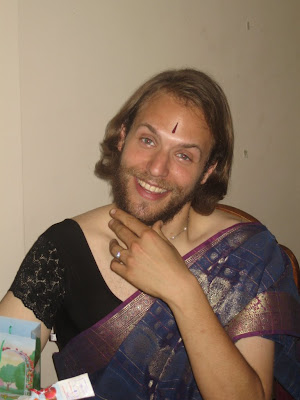
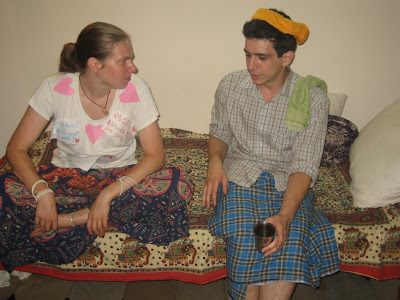
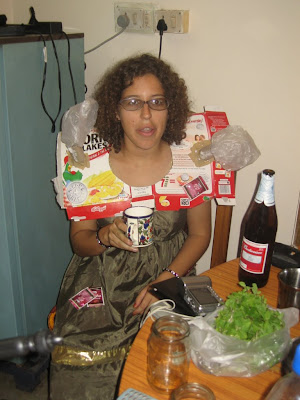
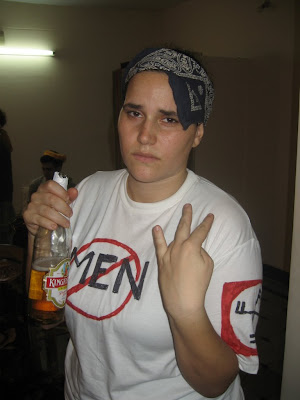
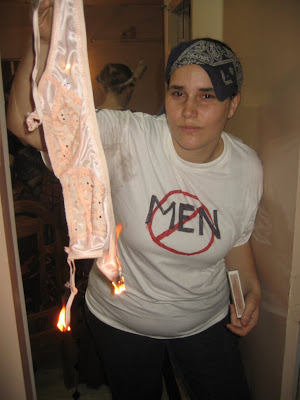
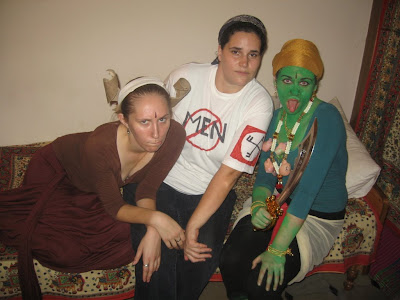

Still recovering from Purim the night before, we awoke on Holi morning and got dressed in our worst clothes. When we first stepped outside we were chased by a group of multicolored people - people who were unidentifiable due to being covered in florescent colored powder. We escaped and bought some white shirts at the 25 Rupee store in our neighborhood, then took autos to our friends house.
Everywhere we went on Holi, we saw people covered in colors standing on the street, riding around on motorbikes, hanging out of autos, and various landscapes covered in pink or red, evidence of an earlier color war.
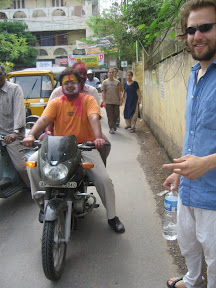

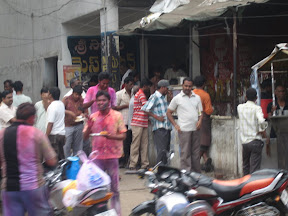
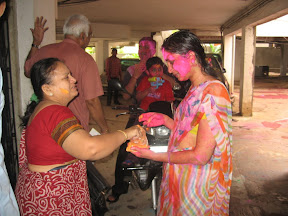
My neighbors
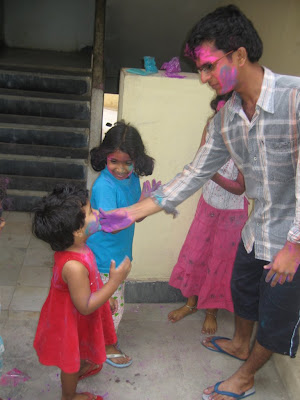

At first we were playing friendly, putting powder on each others shirts and faces, but then Kiba found the bucket and began chasing people with full buckets of color powdered water. "Playing Holi" was so unbelievably fun, like the best game you played when you were a kid, a giant colored powder and colored water fight.
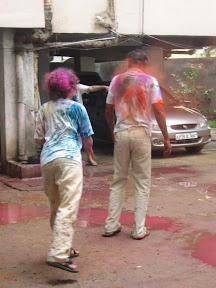


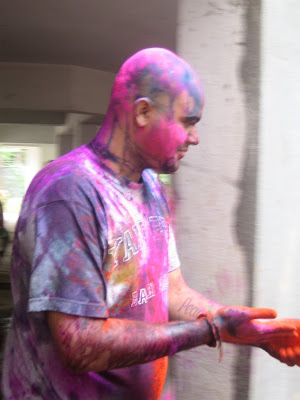
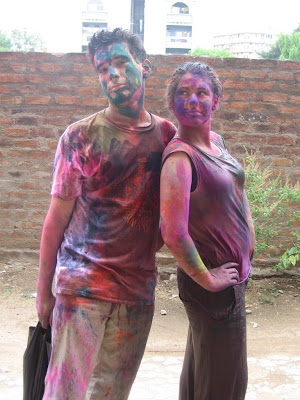
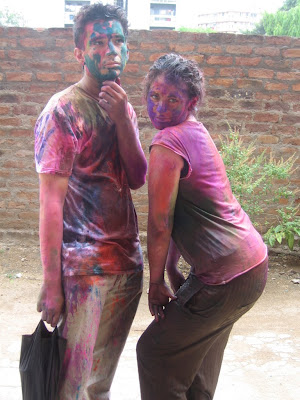


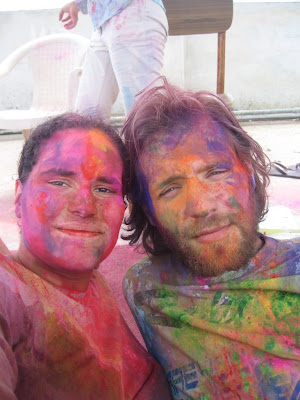
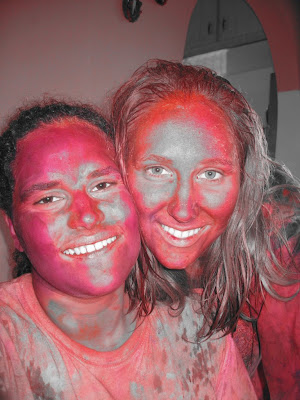
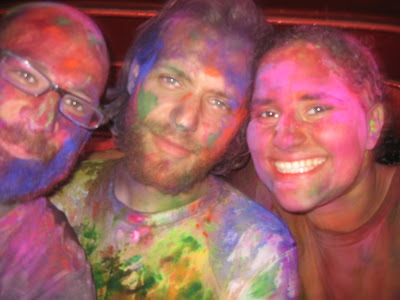
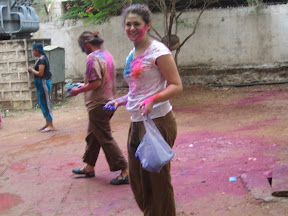
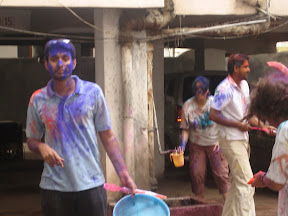
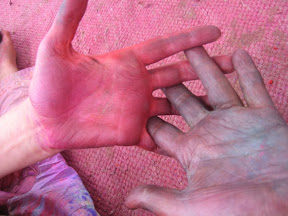
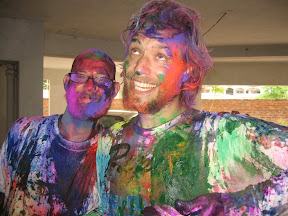


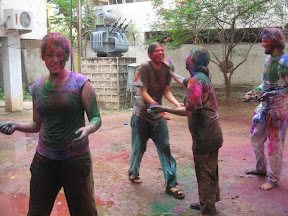
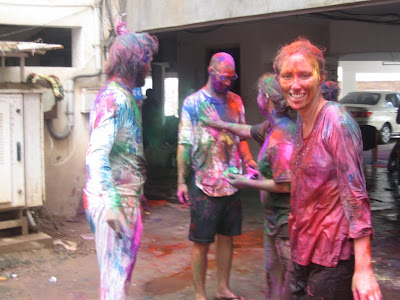

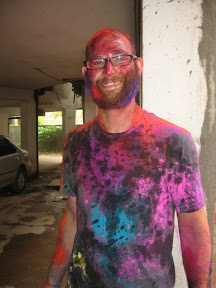

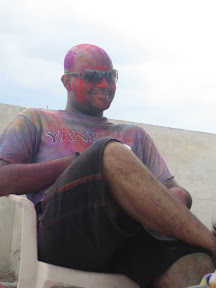

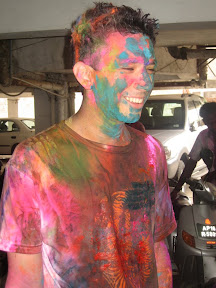

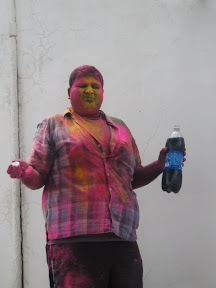
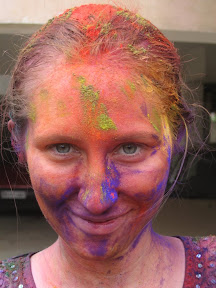
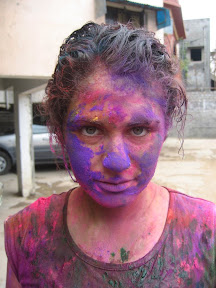
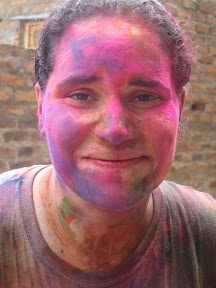
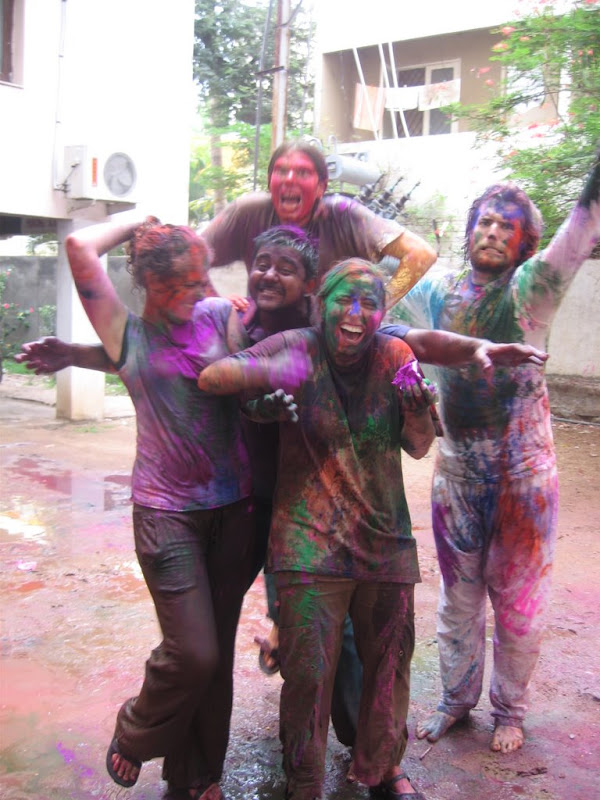


Purim involves reading the Megillah (the story of the hidden miracle of Queen Esther). Traditionally Purim involves dressing up in costumes.
Shlayma was Kali, the Hindi goddess of death and destruction.
Aaron didn't have a costume, so we put him in my saree and made him a hijra. The highlight of the evening was when the biryani arrived and he started doing the hijra clap in the face of a bewildered and highly amused delivery boy.
Leah was the Telugu 4 questions; Yoni was a porter.
Lauren was pollution.
Shlayma believes that Purim is all about controversy. Thus, I felt justified that my Feminazi costume was at least sort of appropriate.
Lily the Holy Cow; me the Feminazi; Shlayma as Kali
group photo
Still recovering from Purim the night before, we awoke on Holi morning and got dressed in our worst clothes. When we first stepped outside we were chased by a group of multicolored people - people who were unidentifiable due to being covered in florescent colored powder. We escaped and bought some white shirts at the 25 Rupee store in our neighborhood, then took autos to our friends house.
Everywhere we went on Holi, we saw people covered in colors standing on the street, riding around on motorbikes, hanging out of autos, and various landscapes covered in pink or red, evidence of an earlier color war.



My neighbors
At first we were playing friendly, putting powder on each others shirts and faces, but then Kiba found the bucket and began chasing people with full buckets of color powdered water. "Playing Holi" was so unbelievably fun, like the best game you played when you were a kid, a giant colored powder and colored water fight.





Subscribe to:
Comments (Atom)
Links
About Me
- Mylarobin
- United States
- I wrote this blog while working at a women's resource center in Hyderabad, India through a social justice fellowship through American Jewish World Service.
